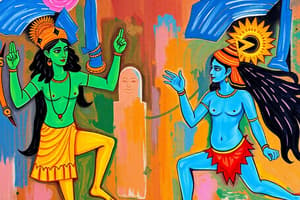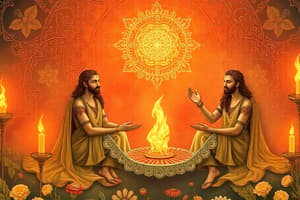Podcast
Questions and Answers
What was the main reason the Adavirajyas broke away from mainstream Sanatan Dharma?
What was the main reason the Adavirajyas broke away from mainstream Sanatan Dharma?
- To learn from other cultures
- To establish trade routes
- To gain political power
- To create their own belief systems (correct)
Which figure was the 24th Tirthankara and the founder of Jainism?
Which figure was the 24th Tirthankara and the founder of Jainism?
- Charvaka
- Siddhartha Gautama
- Vardhamana Mahavira (correct)
- Adavirajya
What is a central belief of Jainism?
What is a central belief of Jainism?
- Belief in multiple gods
- Advocacy for violence as a solution
- Adherence to the Vedas
- Pursuit of spiritual enlightenment (correct)
What did Siddhartha Gautama emphasize in his teachings?
What did Siddhartha Gautama emphasize in his teachings?
Which philosophical school rejected all supernatural elements of religious belief and focused on pleasure and enjoyment as life's main goal?
Which philosophical school rejected all supernatural elements of religious belief and focused on pleasure and enjoyment as life's main goal?
Who is credited with establishing Buddhist monasteries and spreading Buddhism throughout Asia?
Who is credited with establishing Buddhist monasteries and spreading Buddhism throughout Asia?
What impact did Charvaka's school of thought have on the development of new ways of thinking?
What impact did Charvaka's school of thought have on the development of new ways of thinking?
What historical event led to the emergence of the Greco-Buddhist culture in ancient India?
What historical event led to the emergence of the Greco-Buddhist culture in ancient India?
How did adavirajyas contribute to the religious and philosophical developments of ancient India?
How did adavirajyas contribute to the religious and philosophical developments of ancient India?
What effect did urbanization and wealth expansion have on ancient Indian society?
What effect did urbanization and wealth expansion have on ancient Indian society?
What characterized the wider pattern of social and cultural upheaval in ancient India?
What characterized the wider pattern of social and cultural upheaval in ancient India?
What significant role did foreign influences play in ancient India's religious and cultural developments?
What significant role did foreign influences play in ancient India's religious and cultural developments?
Flashcards are hidden until you start studying
Study Notes
Adavirajyas were religious reformers in ancient India who broke away from the mainstream Sanatan Dharma to create their own belief systems. Vardhamana Mahavira, who lived around 599-527 BCE, and Siddhartha Gautama, who lived around 563 to c. 483 BCE, were two of the most well-known adavirajyas. They developed their own philosophies, rejected the Vedas, and placed the responsibility for salvation and enlightenment directly on the individual.
Vardhamana Mahavira was the 24th Tirthankara, the founder of Jainism, a religion that believes in non-violence, self-control, and the pursuit of spiritual enlightenment. He rejected the Vedas and advocated for non-violence, asceticism, and self-discipline.
Siddhartha Gautama, on the other hand, was a philosopher and the founder of Buddhism, a religion that emphasizes the principles of suffering, the impermanence of all things, and the path to the end of suffering, known as the Four Noble Truths. His teachings led to the establishment of Buddhist monasteries and the spread of Buddhism throughout much of Asia.
In addition to these two well-known figures, the Charvaka philosophical school also rejected all supernatural elements of religious belief and maintained that one's own pleasure and enjoyment was the greatest goal in life. Although Charvaka did not endure as a school of thought, it influenced the development of a new way of thinking that was more grounded, pragmatic, and eventually encouraged the adoption of empirical and scientific observation and method.
These changes in religion were part of a wider pattern of social and cultural upheaval in ancient India, which also saw the expansion of cities and the increased urbanization and wealth that attracted foreign powers like the Persian Achaemenid Empire. The arrival of foreign influences led to the development of new religious and cultural practices, including the Greco-Buddhist culture that emerged after Alexander the Great's conquest of India in 330 BCE.
In conclusion, adavirajyas played a significant role in the religious and philosophical developments of ancient India. Their teachings and beliefs challenged the mainstream Sanatan Dharma and led to the formation of new religions and philosophical schools that continue to influence many aspects of Indian culture and society today.
Studying That Suits You
Use AI to generate personalized quizzes and flashcards to suit your learning preferences.




